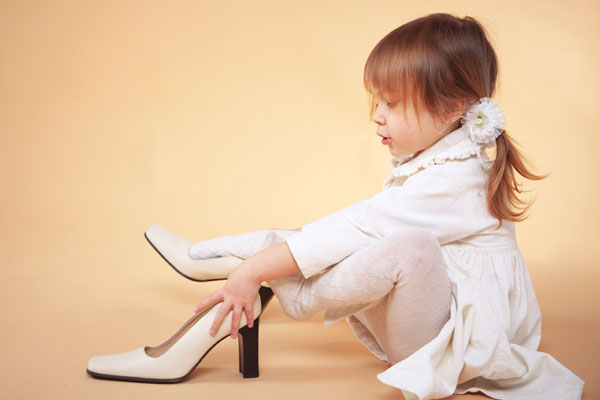Despite the rise of campaigns that aim to curb premature sexualisation of children, the younger generation continues to be influenced by what the media wants them to believe. Where do the media draw the line when it comes to selling a product?
Pro-active parents across the globe have raised concerns about the commercialisation and the sexualisation of children. The claim is that a shield of protection is needed to ensure that children are not bombarded with inappropriate images and content. This is not just a concern on the web through social media and on-line purchasing, it is also evident implicitly and often explicitly through services and goods, such as toys and clothes that are advertised with children and young people as their
target market.
It is felt that children should be protected from advertising, marketing and media content that expose them to sexual images or excessive pressure to consume. Meanwhile, slogans on children’s clothes, padded bras advertised for young girls aged as young as seven and Playboy logos on pencil cases appear to be in a different category of seriousness as compared to young girls playing with make-up, ‘violent’ games or boys walking around with their jeans worn way below the waist.
Should children have the final say on their clothes once they hit double figures, which may mean dressing ‘provocatively’ or ‘inappropriate for their age’? Both are subjective terms that mean different things depending on where you live in the world, what school you go to and which pop stars, if any, you like. There is no black and white area. Yet there appears to be a consensus on what is wrong — or is there?
Has the media gone too far? Is capitalism more at play than values in progressive societies or has being politically correct made us all crazy?
We are clearly swayed by our own cultural and other values. Most want their children to enjoy childhood and be safe. Research shows that, on the whole, parents see childhood as a time where innocence is present.
What they don’t see
A poll for the Chartered Institute of Marketing in the UK said that the most common concern for parents is ‘inappropriate’ advertising during children’s television shows. More than 40 percent of parents are worried about the development of adult products for children, such as t-shirts with sexualised slogans, encouraging them to be materialistic and inappropriate language in mainstream songs. Four out of 10 parents said they were concerned about marketing directed at children via Facebook.
 These concerns may be valid; in fact, marketing is only part of it. Placement of products and product design or development is a major concern as well as the rationale for the products in the first place. It may be that the culmination of all these facets are jeopardising parents’ relationships with their children and encouraging them to think adult thoughts too soon. Reputations may be tarnished along the way.
These concerns may be valid; in fact, marketing is only part of it. Placement of products and product design or development is a major concern as well as the rationale for the products in the first place. It may be that the culmination of all these facets are jeopardising parents’ relationships with their children and encouraging them to think adult thoughts too soon. Reputations may be tarnished along the way.
Children, on the other hand, have expressed conflict or rebellion as a normal stage of development, where purchasing choice is an expression of their individuality and power.
In the book So Sexy So Soon: The New Sexualised Childhood and What Parents Can Do to Protect Their Kids, Levin and Kilbourne explain how children today are being prematurely induced into inappropriate forms of sexual behaviour, particularly as a result of their exposure to media and commercial marketing. The concern here relates partly to children’s viewing of media material designed for an older audience (such as music videos) and to material explicitly targeting them (such as teen magazines, clothing and toys).
Although the primary focus is on girls, viewed as being preoccupied with the need to appear sexually attractive at a younger age, material is also believed to affect boys’ attitudes towards girls and their own self-image. The authors argue that the sexualisation of childhood has a range of damaging consequences for children’s mental and physical health. In extreme situations, they believe this can lead to depression and suicide, eating disorders and abuse, where children are victims and parents are sometimes powerless.
The solution
Talk to your children and share your views on right and wrong from an early age. Keep such conversations alive to ensure full transparency. Beaware of the type of marketing that is out there, whilst also knowing where your child spends his or her time and money both on and off line.
If companies make a stance and embrace corporate social responsibility by making appropriate decisions when developing products and services for children, this certainly can help avoid parents, schools, agencies, societies, regulators and governments from complaining.
Oscar-winning actress Jennifer Lawrence thinks it should be illegal to call someone fat on TV. According to her, media needs to take responsibility for the effect that it has on the younger generation.
Shocking statistics
 A study by University College London has found that around 10 percent of 13-year-old girls are terrified about putting on weight. Their findings, in the Journal of Adolescent Health, came from interviews with the parents of 7,082 13-year-olds.
A study by University College London has found that around 10 percent of 13-year-old girls are terrified about putting on weight. Their findings, in the Journal of Adolescent Health, came from interviews with the parents of 7,082 13-year-olds.
Nearly 12 percent of girls and five percent of boys were terrified by the thought of getting fat. Fifty-two percent of girls and a third of the boys said they were a little worried about gaining weight. The ratio of those distressed by their body shape was one for every three girls and one for every four boys.





































